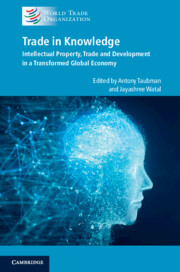Book contents
- Frontmatter
- Contents
- Figures
- Tables
- Contributors
- Preface
- 1 Thematic Overview: Charting the Evolution of Knowledge Flows
- Part I Conceptual Framework
- Part II Measuring Trade in Knowledge
- Part III Impact of Knowledge Flows on Trade and Development
- Part IV Policy, Regulatory and Legislative Frameworks
- Part V Looking Forward
- Index
19 - Streaming of Music and Audiovisual Works
from Part IV - Policy, Regulatory and Legislative Frameworks
Published online by Cambridge University Press: 17 February 2022
- Frontmatter
- Contents
- Figures
- Tables
- Contributors
- Preface
- 1 Thematic Overview: Charting the Evolution of Knowledge Flows
- Part I Conceptual Framework
- Part II Measuring Trade in Knowledge
- Part III Impact of Knowledge Flows on Trade and Development
- Part IV Policy, Regulatory and Legislative Frameworks
- Part V Looking Forward
- Index
Summary
As digital dissemination has become an increasingly important means of exploiting music and audiovisual works, this has necessitated reform in copyright and related rights regimes in order to enable rightholders to receive the compensation to which they are entitled without unduly burdening users’ ability to benefit from these innovative services. The legal regimes that govern streaming of music and audiovisual works in the United States and the European Union have already undergone considerable change to address these concerns, and further changes are likely in the future. In the United States, recent reforms have focused on protecting the rights of music and sound recording creators to receive compensation for the use of their works by licensed streaming services. However, the unlicensed digital dissemination of music and audiovisual works remains a serious problem, leading some observers to criticize the broad scope of the safe harbours that protect Internet intermediaries. In the European Union, recent reforms have focused on two areas: (1) facilitating cross-border licensing of digital dissemination in order to further the goal of a digital single market, and (2) protecting rightholders against unauthorized digital exploitation of their works. On the latter point, the recently adopted DSM Directive subjects Internet intermediaries to a greatly increased risk of infringement liability, in stark contrast to the strong safe harbours they continue to enjoy in the United States.
- Type
- Chapter
- Information
- Trade in KnowledgeIntellectual Property, Trade and Development in a Transformed Global Economy, pp. 555 - 590Publisher: Cambridge University PressPrint publication year: 2022

